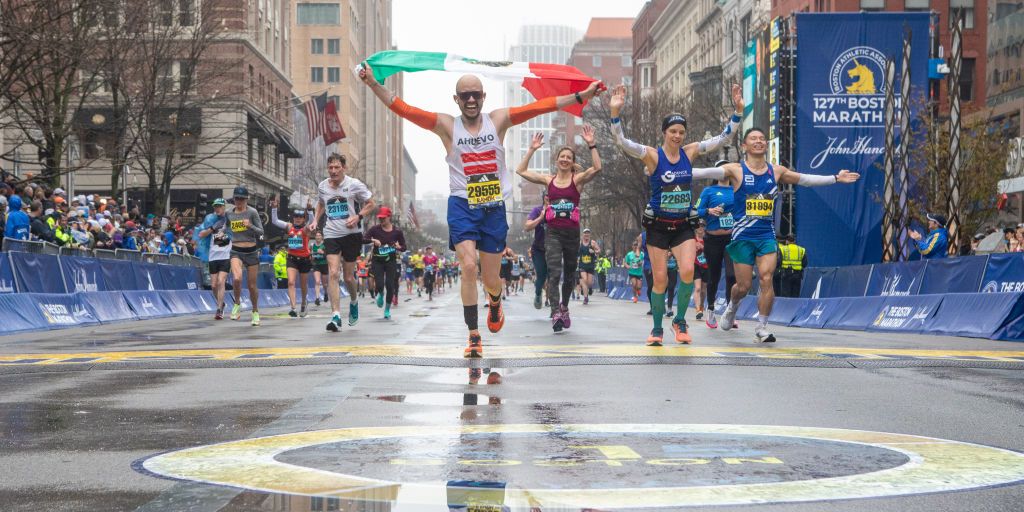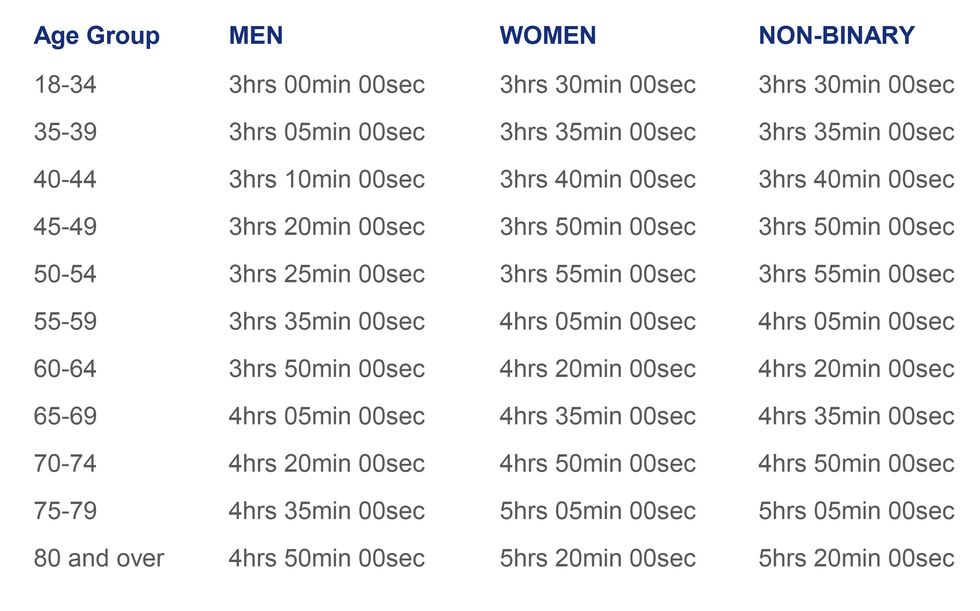Boston Marathon is the oldest annual marathon, one of the six World Majors, and one of the most famous and prestigious road races in the world.
For many runners, getting to run Boston Marathon is a lifetime goal. This is partly because, in order to run Boston, you need to get a qualifying time, and so it is seen as the pinnacle of amateur running. And then there is simply the attraction of its unique atmosphere and history.
Here's everything you need to know about the 2024 race – and how to register for a place if you have a qualifying time.
When is the 2024 Boston Marathon?
The 128th Boston Marathon will be held on Monday 15 April 2024.
How do I qualify for Boston Marathon?
To qualify for Boston Marathon, you need to run a qualifying time in another eligible marathon. To be eligible, a race must be on a course certified by a national body, such as England Athletics, USATF, AIMS or other country's equivalents.
The time you need to run depends on what age/gender category you fall into (see table below). However it is important to understand that running a qualifying time does not guarantee entry. If the total number of people submitting their qualifying times exceeds the number of spaces available in the race, then places will fill up from the fastest first. There have been years where not all qualifiers get entry into the race, for this reason.
How long is my qualifying time eligible for?
The qualifying window for Boston runs for more or less one calendar year. For the 2024 race, it began on 1 September 2022 and finishes the day that entry closes on 15 September 2023.
I've got a qualifying time – when does the qualifier registration open and how long do I have to enter?
Qualifier registration opened on Monday 11 September 2023 at 10:00am ET (3:00pm GMT) and will close on Friday 15 September 2023 at 5:00pm ET (10:00pm GMT). You can register at the B.A.A.'s online platform, Athletes' Village.
How much does Boston Marathon cost to enter?
The entry fee for Boston Marathon 2024 is $230 for United States residents and $235 for international residents. This entry fee is only processed once your place in the 2024 race is confirmed. You can also purchase insurance at this point too.
Why is Boston Marathon always on a Monday?
Since it began back in 1897, the Boston Marathon has always been held on Patriot's Day, a public holiday in the US states of Massachusetts and Maine. This was fixed at April 19, so the race would simply take place on whatever day of the week April 19 fell that year. However, in 1969, the holiday was officially moved to the third Monday in April, and both the holiday and the marathon have been held on that day ever since – with the sole exception of the first post-Covid race, which like many in 2021, was held in autumn rather than spring.
How tough is Boston Marathon?
Many runners might suggest that Boston is the hardest of the six Majors, though of course there are tougher marathons out there. Of the Majors, New York also has hills but Boston's course is particularly hard to get right, due to the long fast downhill start combined with the late selection of hills. It is certainly a tougher course than London, Tokyo, Berlin or Chicago.
The fastest time ever run at Boston is 2hrs 3mins 2secs, set in 2011 by Geoffrey Mutai. At the time, that was nearly a minute faster than the world record, but the course is not eligible for world records. This is because to be eligible, courses must start and end at relatively close points, and at close to the same elevation. Boston, however, is a point-to-point course, a more or less straight line of 26.2 miles from outside Boston into the city centre. In 2011, runners had a substantial tail wind for the entire course, which is why courses like this are not eligible. Luckily most runners will be aiming less for a world record, and more for a PB – or just to enjoy the race.
What exactly is Heartbreak Hill?
Heartbreak Hill has become synonymous with Boston Marathon. It is the last, and steepest, in a series of four hills in the affluent and leafy suburb of Newton – and it comes when runners have already got 20 miles in their legs. So while it is far from the steepest hill that most runners will encounter in their race careers, it certainly takes its toll, particularly on those who started the downhill first section of the race too fast. And many do.
Heartbreak Hill actually got its name from the 1936 edition of the race. Ellison "Tarzan" Brown, a Native American runner of the Narragansett tribe had finished 13th the previous year, wearing shoes so threadbare that they fell apart, and he ran the last seven miles barefoot. Cut to Newton hills, 1936, and he is in the lead. But the hills are tough, and the race favourite and returning champion, Johnny Kelley, catches him and looks set to overtake. But Tarzan digs deep, finds a new gear and races home to victory – according to journalists at the time, breaking the champions heart in the process. Hence the nickname was born.
What is the weather usually like for Boston Marathon?
The weather at Boston can be erratic and tricky to predict, and there have been sweltering hot years and miserably cold ones. In 2018, in torrential rain and high winds, more than half the elite field dropped out. Des Linden and Yuki Kawauchi were the elite winners, though in times that were the slower they had been for decades. In 2012, it was over 30ºC. The average high temperature for April in Boston is 13.8ºC, and average low is 5ºC, with a 37% chance of rain. But as with all marathons, what you get on the day might not be average.
What happens if I get injured?
Boston Marathon places cannot be deferred due to injury -–alas, you will have to requalify for the event. If you have purchased the race insurance, you may be able to reclaim your race fee.
However as of this year, the organisers have changed their pregnancy policy to allow pregnant runners or those who have recently had a baby, to defer their Boston Marathon race entry for up to two years.


